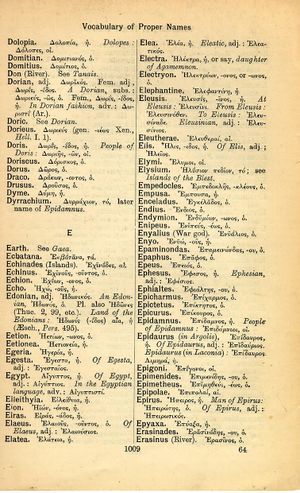Epigoni
Φιλοσοφίαν δὲ τὴν μὲν κατὰ φύσιν, ὦ Βασιλεῦ, ἐπαίνει καὶ ἀσπάζου, τὴν δέ θεοκλυτεῖν φάσκουσαν παραίτου. → Praise and revere, O King, the philosophy that accords with nature, and avoid that which pretends to invoke the gods. (Philostratus, Ap. 5.37)
English > Greek (Woodhouse)
Ἐπίγονοι, οἱ.
Latin > English (Lewis & Short)
Ĕpĭgŏni: ōrum, m., = Ἐπίγονοι,
I the After-born.
I The sons of the seven heroes who went together against Thebes, Hyg. Fab. 71; as the name of a tragedy of Aeschylus, translated into Latin by Attius, Cic. Opt. Gen. 6, 18; id. Tusc. 2, 25, 60; id. Off. 1, 31, 114.—
II The children of the soldiers of Alexander the Great by Asiatic women, Just. 12, 4 fin.>
Latin > French (Gaffiot 2016)
Ĕpĭgŏnī,¹⁶ ōrum, m. (Ἐπίγονοι), Épigones [descendants des sept héros grecs qui dirigèrent la première expédition contre Thèbes et y périrent ; titre d’une tragédie d’Eschyle traduite en latin par Accius : Cic. Opt. 18 || nom donné aux enfants des soldats d’Alexandre mariés en Asie : Just. 12, 4, 11.
Latin > German (Georges)
Epigonī, ōrum, m. (επίγονοι), die Nachkommen, von den nachgebliebenen Söhnen der sieben gegen Theben vereinigten u. vor dieser Stadt gefallenen Fürsten, welche zehn Jahre darauf den Krieg erneuerten, Hyg. fab. 71. – dah. Name einer Tragödie des Äschylus, Cic. Tusc. 2, 60, die Accius zu einer gleichn. latein. benutzte, Cic. de off. 1, 114; de opt. gen. 18.

